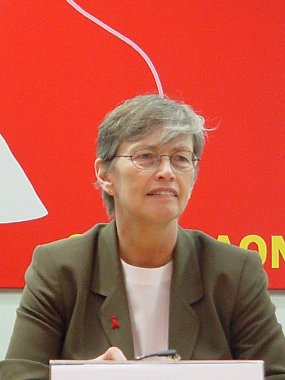
''War is waged by adults, but it is the children who suffer the most,'' Unicef head Carol Bellamy said. ''This protracted fighting and instability is wreaking havoc on Iraqi children.''
U.N. says conflict in Iraq is 'wreaking havoc' on children
By Sam Cage, Associated Press, 11/23/2004 10:40
ADVERTISEMENT
GENEVA (AP) Fighting in Iraq is ''wreaking havoc'' on the country's children, nearly doubling malnutrition rates since the start of the war and all but preventing relief groups from working in the country, the U.N. children's' agency said Tuesday.
In a sign of the difficulties faced by humanitarian efforts, the first independent aid convoy to enter the Iraqi city of Fallujah after two weeks of fighting had to turn back before delivering any aid because of security fears, the international Red Cross said.
The Red Crescent convoy of ambulances and three trucks carrying blankets, water and first-aid kits managed to enter the city on Monday and saw a few civilians before it had to turn back, Ahmed Rawi, a spokesman for the International Committee of the Red Cross, said.
The Marines said the team was briefed on the aid situation in the city and visited a relief site but was advised by military officials not to distribute aid.
''They did not deliver any assistance,'' Rawi said, adding that he was waiting for the convoy's report. ''We want to see what they saw inside. We want to see their evaluation of the conditions.''
The U.N. children's agency, UNICEF, said there was little it could do to ease the plight of children across Iraq because the violence prevents most relief agencies from conducting most operations in the country.
''Humanitarian work in Iraq has been crippled by the fact that international aid agencies, including the U.N., have been directly targeted and forced to conduct their humanitarian operations largely from neighboring countries,'' UNICEF said in a statement.
Hundreds of thousands of Iraqi children are suffering from diarrhea and nutrition deficiencies, UNICEF chief Carol Bellamy said.
A survey Monday by the Norway-based Fafo Institute for Applied Social Science said that since the March 2003 invasion, malnutrition among children between the ages of 6 months and 5 years old has grown to 7.7 percent from 4 percent.
Years of sanctions, tyranny and war have crippled the country, and even before the latest conflict one in every eight Iraqi children died before the age of 5, Bellamy said.
''War is waged by adults, but it is the children who suffer the most,'' Bellamy said. ''This protracted fighting and instability is wreaking havoc on Iraqi children.''
Young children are the most vulnerable to malnutrition, which is exacerbated by a lack of clean water and adequate sanitation, she said.
UNICEF is continuing its Iraqi operations from outside the country, including immunization campaigns and repairing schools, but this ''is not enough to protect the health of all of Iraq's children.''
Meanwhile, the U.N. refugee agency said Tuesday that about a third of Iranian Kurd refugees at a long-established camp in western Iraq may have fled because of fierce fighting in the city of Ramadi last week.
About 13,000 Iranian Kurds had lived in al-Tash camp for about 20 years, many of them having fled Iran fearing oppression in the wake of the 1979 Islamic Revolution. Many left the camp before the U.S.-led war in Iraq after threats by local people and dwindling relief supplies.
Ron Redmond, spokesman for the U.N. High Commissioner for Refugees, said there were reports that up to 35 percent of the 4,200 refugees still in the camp may have left ''in the past few days'' after gunmen attacked the camp.
The Red Crescent convoy that entered Fallujah on Monday was apparently escorted by Iraqi security forces, Rawi said. It had wanted to reach the city's El-Roudha Mohammediah mosque, where they expected to find wounded people, but they had to turn back, Rawi said.
The U.S. Marines said the convoy had a short tour of the city and met with military officials. It was briefed on humanitarian assistance and visited one of the five humanitarian aid sites, a Marine statement said. Discussions included removing bodies from the combat zone and treating wounded civilians.
The Marines noted that the Red Crescent wanted to deliver its relief supplies, ''but was advised against doing so by the Iraqi Brigade Commander who stated there was only a desire for extra blankets.''
Lt. Gen. Lance Smith, deputy commanding general of the U.S. Central Command, told reporters in Washington last week that humanitarian assistance in Fallujah was being provided by U.S. military forces, Iraqi security forces and ''other humanitarian organizations.''
He didn't elaborate, and relief organizations based in Geneva said they had no idea which humanitarian groups he was referring to.
Associated Press writers Alexander G. Higgins in Geneva and Edward Harris in Baghdad contributed to this report.






